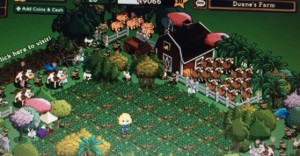James Paul Gee provides empirical evidence to support his claim that good video games incorporate the principles of good learning. In his article Good Video Games and Good Learning, Gee discusses sixteen learning principles which can be identified as positive qualities of these games, and having played many himself, he takes the opportunity through his writing, to share his personal discoveries. These experiences, he is convinced, demonstrate that thinking and learning are promoted through engagement in these games.
Many researchers, including Tom Bissell, point to the possible negative impact of specific games. As a parent, I too have questioned whether the benefits of playing video games outweigh the disadvantages. I was particularly concerned about violence, profane language and the absence of role models which can negatively impact young minds. Additionally, I am convinced that virtual reality is in fact actual reality for many, as there is a very thin dividing line between the two concepts. However, the advent of the virtual game, Farmville, in 2009, was welcomed as clean fun that could be enjoyed by all family members.
Farmville was created by Zynga of San-Francisco and launched on the social networking website, Facebook, in June 2009, as a free application. On February 4th, 2010, Microsoft MSN Games launched Farmville on its own site. There were then over 88 million monthly active users and the Facebook fan page had 22 million fans. It was immensely popular partly because of the structure of the game which had as an objective to create a real time strategy game (RTS) for Facebook. But credit must also be given for the use of remediation by the developers as they applied other existing technologies to create the new product. For example, they used the concept from the avatar generation engine from a previous game called YoVille.
Players of Farmville would create an avatar and receive a plot of land on which they could raise animals and plant crops. These crops had different costs and varied gestation periods. The growth times were calculated to be realized in real time. Players could communicate with their Facebook friends by clicking a button, if they needed assistance or wished to buy or sell produce or animals at prices fixed by the game. They could also collaborate with Facebook friends to raise barns on the friends’ plots. But, if the crops were not harvested when they were ripe, they died. Therefore, players had to pay attention to the varied harvesting times and work to get as much virtual currency as possible to buy more land, seeds, livestock and decorative elements. The rewards included accumulating ribbons and earning bragging rights.
My daughter, who was a teenager at the time, became interested and found the game, colorful, attractive and engaging. I observed her with amusement as the game made so many demands on her time, that in an effort to maintain ‘profitability,’ she would rush home to get on the computer so that she could attend her crops. She enjoyed interaction with her Facebook friends, and game requests would end in animated conversations on the phone. Soon, however, I became concerned as study and rest times were interrupted for the game. Fortunately, I did not have to intervene. When the pressure became unreasonable, she abandoned the game, but not with any bitterness. She explained that she enjoyed the freedom to make decisions, learned invaluable lessons about negotiating, trading and developing business skills, her social skills also improved through constructive discussions with friends, or through networking.
It was not difficult to make connections with the arguments presented by Gee. My daughter had to apply her knowledge to solve problems and maintain a viable ‘farm,’ and all of this was done within the confines of the rules established by the game. She became committed to the tasks she had to perform, developed a new identity as an entrepreneur, taking risks as she made decisions, and for a time, she lived in that virtual world. Therefore, included in the learning principles she was exposed to were identity, interaction, production, risk taking, agency,challenge and consolidation, explore, think laterally, rethink goals and performance before competence.
The principle of identity entails having the learner assume a new identity and commit to it through the activity. Interaction involves real dialogue which facilitates feedback, while production helps players to utilize their creative skills. All of these actions involve risk-taking which is the result of exploration. But because it happens in a game, players are not afraid to take risks, as a matter of fact, this becomes part of the fun. Failure does not depress players, instead, they learn that it is one of the possibilities of taking risks which have agency as a major reward, since they can claim ownership for their actions. Although Farmville was not a difficult game, players faced a number of challenges related to survival and success. The game gave them the freedom to choose how they would solve problems and apply these solutions in the future. Sometimes, as they explored and applied new reasoning to the game, players would adjust their goals accordingly. Farmsville also gave individuals of many age groups an opportunity to perform before they became competent at the game, thus allowing room for reflection and strategic planning.
The game won a number of awards including the Academy of Interactive Arts and Sciences, 2010 game Developer’s Conference Best New Social Online Game Award and the the DICE Social Game of the Year Award. However, although there was major growth in the number of players, there was an equally rapid petering out of those who initially participated. Introspection by the creators revealed that the participation grew bigger and faster than they could manage and they had to scramble for additional staffing. They realized that new crops and buildings were needed to motivate players to continue, and in maintaining a metrics-driven company, speed, internet efficiency and meeting the expectations of players were important.
Therefore, they created an enhanced Farmville 2 in which crops could be crafted to feed the animals, lumber could be used on new buildings, and players could tweak their virtual farms as much as they wished to, then they could sell the products in their market. A very important adjustment was the time change. In the new game the real time pressures were removed. Players could engage in just ten minutes of activity and return to the farm at a later time if that was convenient for them. With time, we will be able to judge the value of these changes and whether the improved game gained the anticipated momentum. Undoubtedly, good games can and do make a contribution to learning



It’s so nice to read about a wholesome game that promotes good caretaking and responsibility over death and destruction. It reminds me of the projects of old like taking care of an egg to develop parenting skills or managing a fantasy stock portfolio to learn about managing money. It’s also nice to hear that your daughter was mature enough to walk away when the game impeded too much on her real commitments. I like the way you applied the learning principles Gee teased out with respect to gaming. Thank you.
Thank you for your support Phyllis. It is very much appreciated in a world where people have become numb to violence and vulgar language